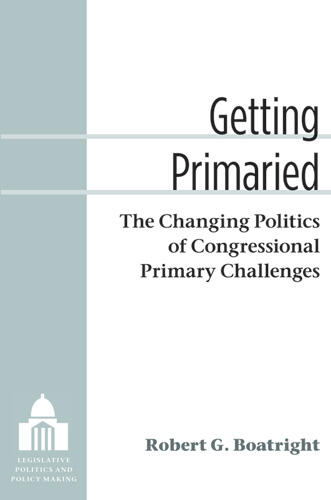Getting Primaried
The Changing Politics of Congressional Primary Challenges
The recent rise of “primarying” corresponds to the rise of national fundraising bases and new types of partisan organizations supporting candidates around the country
Description
Each of the past few election cycles has featured at least one instance of "primarying," a challenge to an incumbent on the grounds that he or she is not sufficiently partisan. For many observers, such races signify an increasingly polarized electorate and an increasing threat to moderates of both parties.
In Getting Primaried, Robert G. Boatright shows that primary challenges are not becoming more frequent; they wax and wane in accordance with partisan turnover in Congress. The recent rise of primarying corresponds to the rise of national fundraising bases and new types of partisan organizations supporting candidates around the country. National fundraising efforts and interest group–supported primary challenges have garnered media attention disproportionate to their success in winning elections. Such challenges can work only if groups focus on a small number of incumbents.
Getting Primaried makes several key contributions to congressional scholarship. It presents a history of congressional primary challenges over the past forty years, measuring the frequency of competitive challenges and distinguishing among types of challenges. It provides a correction to accounts of the link between primary competition and political polarization. Further, this study offers a new theoretical understanding of the role of interest groups in congressional elections.
Robert G. Boatright is Associate Professor of Political Science at Clark University. He is the author of Interest Groups and Campaign Finance Reform in the United States and Canada (University of Michigan Press).
Reviews
“Boatright sets the record straight on a remarkably tricky area of American politics.”
—Seth Masket, University of Denver
“Getting Primaried is solid scholarship. It will be the source on primary election politics.”
—Eric S. Heberlig, University of North Carolina, Charlotte
"Solid, well-written scholarship. Recommended."
- R.E. O'Connor, National Science Foundation
—CHOICE
"Boatright’s analysis is a fair-minded correction to political chatter that has exaggerated the importance of getting primaried."
- Congress and the Presidency
—Congress and the Presidency
"Those interested in why and how the Ned Lamonts, Bill Halters, and Joe Millers of the world can rise to challenge (and in the case of Lamont and Miller, defeat for nomination) powerful incumbents should read Boatright's book before [the 2014] primaries begin in earnest."
- National Journal
—National Journal (from "The Best Political Books We Read in 2013")
"...a book filled with powerful, compelling, and robust statistical tests. Because of Boatright’s work in analyzing congressional primaries, we must, at least, question the conventional wisdom. Such rethinking should be done at all levels of political understanding and engagement. Scholar and political observer, alike, need to heed these results."
- American Review of Politics
--American Review of Political Science
News, Reviews, Interviews
Op-Ed | SFGate
Interview | Vox Interview | Monkey Cage blog at the Washington Post Op-Ed | Politico
Op-Ed | U.S. News & World Report Paper for the 2017 States of the Parties Conference, Akron, Ohio | University of Akron

